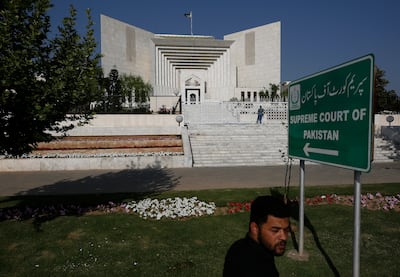At the 2020 World Economic Forum, Imran Khan, Pakistan's Prime Minister, highlighted what he viewed as a key impediment limiting the potential of his country: chronic bad governance. "Sadly our governance deteriorated in the past 30 years,” Mr Khan told a live audience. “That is one of the biggest reasons we have not been able to fulfil our potential as a country. From now on, my biggest challenge is how we can improve our state institutions, so we can improve our governance, so we can tap our potential."
Two years later, it is proving hard to complete the mission. Sunday's dissolution of the country's Parliament, which Mr Khan requested in response to an attempt by opposition MPs to oust his government, demonstrates as much. This comes at a time when Pakistan is facing heightened economic difficulties, with inflation rates above 12 per cent, and foreign debt at 43 per cent of GDP, or $130 billion. Far from concentrating on the critical economic challenges it faces, Pakistan will now be preoccupied with containing fresh political turmoil and the prospect of sudden elections. Chaos in Parliament is particularly bad for Mr Khan, who had pitched himself as a candidate of competent reform, forged by years of high-profile success outside politics as a cricketer. With another crisis brewing, the risk for Mr Khan is that this novelty wears off, and that more Pakistanis view his government as more of the same.
This is not to deny the immense difficulty of the task he faces. Pushing change in Pakistan has to happen in a number of domains, not just on the streets and in Parliament. Maintaining relations and transparency in a time of crisis with, among other institutions, the army and the courts, major centres of power, will be even more sensitive than usual. A return to these ideals, however hard it might be in the crucible of today's crisis, is key for the long-term well-being of the country and the region, given Pakistan's huge population, economic and political clout and strategic importance.

There are ways Mr Khan and his government can go about challenges more responsibly, however. He has exacerbated the situation at home and abroad by relying on conspiratorial rhetoric. He blamed the opposition’s attempted no-confidence vote, for instance, on foreign actors, a diversionary tactic that dangerously weaponises mistrust among the public to draw attention from political failings for which only the domestic government is responsible.
At home such rhetoric might curry favour with one section of the electorate, but it will certainly alienate others, and risks hurting his standing abroad at a time when international diplomacy is already being stretched to its limits.
One of the largest countries in Asia and a nuclear power, what happens in Pakistan is of huge importance to the world. The country is one of boundless potential, but it is also far too divided. Populist rhetoric and political intrigue will not guide Pakistan closer towards its brightest future. Co-operation and transparency will.

